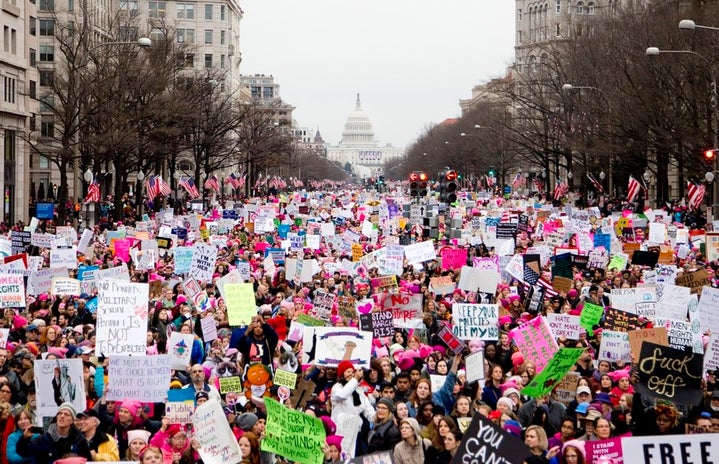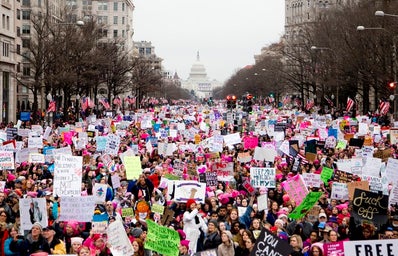A year ago, as the world began restructuring itself to respond to COVID-19, workplaces overwhelmingly rerouted to people’s kitchen tables, home offices, and basements. As early as February and March of 2020, people began to take note of what the pandemic’s work shift did to women: an overwhelming amount of female professionals who had been the primary breadwinners for their households suddenly also became the sole domestic managers and caregivers for families in isolation. In short, the pandemic didn’t stop women from working, but it forced millions to regress to the all-consuming role of both the housewife and provider simultaneously. As a year of COVID-19 comes to a close, feminists are faced with several questions: has the concept of modern feminism been destroyed, or has it just shifted? How are women actually affected by lockdowns, quarantine, and work-from-home? Is our feminism a wide enough movement to address the needs and injustices faced by all women, not just working white women, during a pandemic?
To understand how COVID has flipped feminism on its head, we have to look back to our grandmothers’ movement. Second-wave feminism, as it’s known historically, was largely about two things: sexual liberation and jobs. Following the stifling gender roles of the 1950s, women wanted to have the same freedom to move into the workforce that their male counterparts did, and ever since then, modern feminism has been shaped around moving women into jobs they didn’t previously occupy. Society’s concept of the “ideal woman” under feminism is the female professional: a woman whose job was probably held by a man twenty years ago, who wears power suits, has a nice office, and makes the money for her family (if she has one). The problem happened when woman got sent home from work sometime last winter to her kids and her husband, who are also stuck at home, and the balance of responsibility shifted to put a disproportionate amount of pressure on working moms who were already strapped with high-level jobs pre-pandemic. Online school, household chores, and dealing with the daily roadblocks of isolation all fell to women, most of whom didn’t have the benefit of being stay-at-home moms before the pandemic hit. In two parent households where both parents had been working prior to the shutdown, children were likely looked after first by school or daycare, then by babysitters or nannies. When COVID-19 hit and parents were suddenly at home, childcare and home management responsibilities largely fell to the woman in the partnership by default. As fast as the pandemic came, it took away the independence of the modern working mom. The problem with saying that the disintegration of a largely upper-middle class and white structure is akin to the fall of modern feminism is that roughly 31% of American women feel they cannot identify as middle-class, with the majority of those being women of color.
American feminism is in the middle of what many would say is a rough transition from its third to fourth wave. The third wave, born out of the 1990s and centered around workplace and reproductive rights, was championed by Gen X and mostly focused on the issues of the educated, working woman who had grown up in the wake of women’s lib and the progressivism of the sixties and seventies. The problem with the third wave was that it didn’t transition well to the internet age, and it overwhelmingly centered white women and their issues above those of marginalized women, creating a brand of feminism that was palatable to general society, but perhaps not so helpful to the women who really needed it. The third wavers loved Hillary Clinton and were highly invested in the #MeToo movement, but they balked at talking about issues like race or class in relation to women’s rights. The third wave represents the working moms who were disenfranchised by the pandemic, but it doesn’t account for the millions of other women who are facing objectively worse conditions during COVID-19. Enter the fourth wave, or more simply intersectional feminism: led by women of color, LGBTQ+ women, and femmes, all of who are conscious about issues of class, disability, and race. Intersectional feminists have been quick to point out that while the pandemic has negatively affected middle-class working women, many more are in dangerous and unsustainable living situations or are vulnerable to systemic inequities. So what does the pandemic actually mean for feminism? There’s no easy answer, but a quick one might be that COVID-19 hasn’t been the great equalizer that it was initially branded as. If anything, a global pandemic has uncovered and shed light on people facing levels of marginalization that were never previously paid close attention to, and has given us a roadmap to fix the big issues that we’ve been facing for years. Income inequality, healthcare access, and protections for minimum-wage employees have become centerpieces of social justice during the pandemic, but the reality is that they’ve always been some of the biggest problems facing Americans. They also are, and should be, feminist issues. Feminism doesn’t fail or end because one group of women lose what they’ve fought for. To imply that modern feminism has failed during the pandemic because of a setback for more privileged women erases the years of work done and the efforts still being made to secure equity for marginalized communities.
As a vaccine is being distributed and the possible light at the end of the tunnel seems within reach, it’s essential to remember that the issues brought to light by the pandemic aren’t going away. The only way to move forward from the damage of the last year is to remember the reasons it was so hard: underlying inequity and systemic marginalization have always been around, but the pandemic made them worse and more prevalent. When we’re all conscious about the issues happening around us, we have a unique ability to change them and improve our communities. Feminism is an all-encompassing movement that aims to address the issues faced by all marginalized groups, and the pandemic shouldn’t be a discouragement or a roadblock to those goals. While it has certainly made things more difficult for everyone, the ramifications of COVID-19 should not be treated as a failure of social justice movements, but rather a signifier of the flaws in our institutions and the ways that people in power have failed to protect their citizens.


